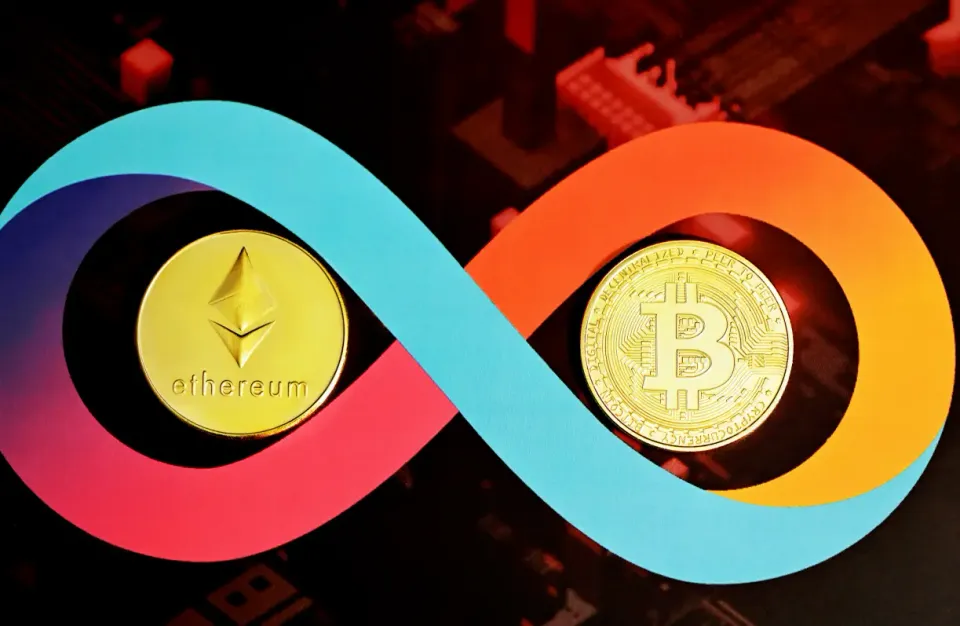Bitcoin vs. Ethereum: Which Is Better to Buy, Trade & Invest?
Bitcoin vs Ethereum: Which Crypto is Better?
Bitcoin (BTC) and Ethereum (ETH) are the two largest cryptocurrencies on the crypto market. Both are the native coins of the top blockchains, Bitcoin and Ethereum, respectively. This is probably the only thing they have in common, from a technical point of view. While Bitcoin is designed as a currency and a store of value, the Ethereum network is designed for smart contracts and decentralized applications that are the backbone of the DeFi industry.
Key Takeaways
- The advent of Bitcoin signaled the birth of a new form of money that operates without any government or corporation.
- Ethereum's major focus is to power immutable decentralized financial contracts and applications.
- While the Bitcoin network is powered by Bitcoin, Ethereum applications and contracts are powered by Ether.
What is Cryptocurrency?
In a broad sense, cryptocurrency is a digital payment system that allows any user, anywhere, to send and receive payments without intermediaries. In a narrow sense, it is a digital asset (e.g., a BTC coin) that uses cryptography for security.
Unlike traditional currencies, cryptocurrencies operate on decentralized networks based on blockchain technology, a distributed ledger enforced by a disparate network of computers (often referred to as nodes). Thus, a blockchain is a public ledger containing all transaction data from anyone who uses a particular cryptocurrency.
Because of the open-source nature of the blockchain, all the records can be viewed by anyone, and any particular address can be examined, ensuring full transparency in the network. Cryptocurrencies can be sent or received anywhere in the world, and may provide a means of financial inclusion for people who do not have access to traditional banking systems.
Many cryptocurrencies (including BTC) are created through a process called mining, where individuals use computer power to solve complex mathematical problems that validate and secure blocks on the network. Miners are rewarded with newly created coins. Cryptocurrencies can be used for a wide variety of applications, from buying goods and services to investment and even as a means to transfer money across borders.
There are thousands of different cryptocurrencies, including Bitcoin (the first and most well-known), Ethereum, Polkadot, Solana, and many others, each with its unique features and uses. Ownership of cryptocurrency is often stored in a digital wallet, which can be hardware-based or online. The ownership and control of the private keys are essential to control the associated funds.
In summary, cryptocurrencies represent a revolutionary form of digital or virtual currency, utilizing blockchain technology to provide a secure and decentralized way to record and store data. They have the potential to change the financial landscape but also come with significant risks and challenges.
What is Bitcoin?
It is right to start off our introduction to Bitcoin by answering the question, What is bitcoin? Probably, you have already heard that Bitcoin is a digital currency. But it is also a decentralized platform, where Bitcoins serve as units of currency. All the transactions made in the Bitcoin network are recorded into its public database — blockchain.
The Bitcoin network operates without the involvement of any central government or bank. Thus, the network computers (nodes) verify transactions and store the payment history, functioning as servers. In order for the transaction to be recorded on the blockchain, the majority of nodes must agree on the transaction’s validity.
Bitcoin was created in January 2009 by an anonymous developer with a nickname Satoshi Nakamoto. He outlined the principles of the decentralized peer-to-peer online currency in the official white papers in 2008.
Originally, Bitcoin was created as a decentralized digital currency in response to the 2008 global financial crisis. However, these days, it is increasingly viewed as a form of “digital gold” that serves as a store of value.
Bitcoin Market Stats

What is Ethereum?
Ethereum is a groundbreaking open-source blockchain network designed to facilitate smart contracts and decentralized applications (DApps). Unlike other blockchain platforms, Ethereum's unique architecture allows developers to build a wide variety of applications on its existing infrastructure, fostering innovation and growth within the crypto space.
At the core of Ethereum's success is its ability to support ERC-20 tokens, a standard for creating and managing crypto within the network. This has led to an explosion of new crypto, each with unique functionalities and purposes. From decentralized finance (DeFi) projects to Non-Fungible tokens (NFTs), Ethereum's blockchain network has become a hub for creativity and technological advancement.
Ether (ETH), the native token of the Ethereum network, serves as both a cryptocurrency and a fuel for executing smart contracts. It's not just a digital asset but a vital component of the network's functionality.
Founded by a team including Vitalik Buterin, Gavin Wood, Charles Hoskinson, Anthony Di Iorio, and Joseph Lubin, Ethereum has grown from a visionary idea into a foundational technology in the world of blockchain. Its ability to support a wide array of applications and crypto assets has positioned Ethereum as a leader in the field, shaping the future of decentralized technology.
Ethereum Market Stats

Good To Know
Unlike Bitcoin, Ethereum is a more flexible blockchain. It can be used by developers to easily launch new applications with their own tokens. These tokens have ERC-20 interoperability standard. There are already over 280,000 cryptocurrency tokens built with the use of the Ethereum blockchain.
Brief comparison Ethereum vs Bitcoin
What Are the Differences Between Bitcoin and Ethereum?
Even though both Bitcoin and Ethereum are based on the distributed ledger technology, they are completely different projects. The competition between the two can hardly be called direct. The projects have different consensus mechanisms, purposes, and future paths.
Proof of Work vs. Proof of Stake
Ethereum used to run on the same proof-of-work (PoW) mechanism as Bitcoin. But with the upgrade called The Merge, Ethereum transitioned to the proof-of-stake (PoS) consensus.
Bitcoin's PoW requires a significant amount of energy and powerful equipment to mine new blocks, a process known simply as mining. Unlike PoW, PoS is much more energy-efficient and has minimal hardware requirements. Thus, PoW and PoS differ in that the latter is more “eco-friendly”. With Proof of Stake, Ethereum’s energy consumption dropped by about 99.95%.
However, PoS has its disadvantages. Validators have to deposit collateral (stake) to validate blocks. Currently, the Ethereum staking amount is 32 ETH, which is equal to about $38,600. Since on PoS blockchains one coin = one vote, there is a risk that participants with large ETH holdings can seize control of the network. If the “whales” determine the further development of the blockchain at their own discretion, the network will be deprived of decentralization.
Purposes
Bitcoin, the pioneer of cryptocurrencies, was primarily designed to serve as a decentralized digital currency, enabling peer-to-peer transactions without the need for intermediaries like banks. Its main goal is to provide a secure, transparent, and decentralized alternative to traditional fiat currencies, acting as a store of value and a medium of exchange. Its underlying blockchain technology ensures the integrity and immutability of stored data, focusing on financial applications. Furthermore, Bitcoin's design includes a built-in monetary policy that controls the creation of new BTCs and aims to mitigate inflation, further distinguishing it from traditional fiat currencies.
Ethereum, on the other hand, was created with a broader vision, extending beyond digital currency. While it also facilitates peer-to-peer transactions through its native cryptocurrency, Ether (ETH), Ethereum's primary goal is to provide a platform for decentralized applications (DApps) and smart contracts. It enables developers to build a wide variety of applications on its existing infrastructure, from decentralized finance (DeFi) to supply chain management and beyond. Ethereum's blockchain network supports the creation and management of various cryptocurrency, allowing for a diverse range of functionalities.
Future
Both networks will continue to evolve. However, the speed of Ethereum's development is much higher, since it was originally created to be much more versatile than Bitcoin. The transition to ETH 2.0 finally solves the blockchain's scalability problems. According to the Ethereum’s founder Vitalik Buterin,
“The network is looking forward to the future expansion of Ethereum scaling”
Among other features, Ethereum will introduce a number of significant upgrades, including making block verification easier and turning Ethereum into a quantum-resistant network that fully supports zk-SNARKs.
Compared to Ethereum’s innovation, Bitcoin is pretty much conservative. Its primary purpose is to serve as digital gold and ensure safe transactions. The speed of development and adoption of new changes are not its top priorities. As experienced blockchain experts put it, complexity is the enemy of reliable and easily verifiable security tools.
However, smart contracts can be enabled on additional layers on top of Bitcoin. The Lightning Network, for instance, allows BTC to be transferred outside the main blockchain. In the future, such scaling solutions are expected to implement full DeFi applications on Bitcoin. This innovation could bridge the gap between Bitcoin and Ethereum, allowing for more complex peer transactions and integration with decentralized platforms.
Bitcoin and Ethereum: Pros and Cons
So far, we have explained the main differences between Ethereum and Bitcoin. Now, let us summarize the key advantages and disadvantages of both projects.
Pros and Cons of Bitcoin
Bitcoin has the following advantages:
- BTC is the first, most popular and high-valued crypto asset.
- Since it has the status of “digital gold”, Bitcoin’s price sets the direction of the entire cryptocurrency market;
- Bitcoin has a limited supply, which makes it resistant to devaluation;
- Almost all cryptocurrency exchanges support BTC;
- It remains the main competitor to traditional fiat currencies;
- The coin gradually becomes more adopted. There is a wide network of BTC ATMs around the world. Many offline services, stores, and restaurants accept BTC as a form of payment.
However, it has disadvantages, too:
- Bitcoin has rather limited functionality, and does not yet support full-featured smart contracts;
- The PoW consensus algorithm makes it extremely expensive to keep the network operational. It requires a significant amount of energy and quickly wears out the equipment;
- The price of Bitcoin is still largely volatile;
- The Bitcoin network is not characterized by high speed, and transaction fees can be high.
Pros and Cons of Ethereum
Ethereum has the following advantages:
- In its development, many of Bitcoin's shortcomings have been considered and corrected;
- Ethereum’s smart contracts make it highly functional;
- The project has a huge number of developers and is actively evolving. It has recently begun the ETH 2.0 upgrade, a part of which was the transition to PoS;
- Ethereum's native token, ETH, is used in various decentralized applications, making it a versatile asset.
The disadvantages of Ethereum are as follows:
- Despite the recent introduction of ETH token burning, the maximum supply of coins is not limited. Thus, Ethereum can be affected by inflation (deflation too);
- There is still a high dependence of ETH price on BTC price movements;
- While it is faster to send ETH than BTC, still the Ethereum network is significantly slower (for now) than those of the third-generation blockchains such as Avalanche or Solana.
Risks of Investing In Bitcoin and Ethereum
Bear in mind that investing in any cryptocurrency always involves risks, even when it comes to the most liquid coins on the market, such as BTC and ETH.
Hype and FOMO Risks
The fear of missing out, or FOMO, is a feeling of anxiety about missing a potentially lucrative investment opportunity. For instance, investors can recklessly buy cryptocurrency when it is skyrocketing, only to see it crash shortly after. Or vice versa, they sell an asset in the fear that it will decrease in value only to regret it later when the price increases.
It is hard to avoid FOMO, especially in the crypto market. A sudden change in price movement or influx of information can cause you to act impulsively. Some strategies to minimize FOMO are to use trusted news sources, study market cycles, and develop your own investment strategy.
Security Risks
Since the crypto market is relatively young and largely unregulated, it is swarming with bad actors. Crypto fraud and scams range from market manipulation to theft. Cryptocurrencies themselves, especially ETH and BTC, are considered to be safe assets. It is nearly impossible to hack into their blockchains. But, fraudsters can hack into cryptocurrency wallets and set up phony exchanges to steal customers’ assets. The biggest hack occurred at once the largest crypto exchange, Mt.Gox, costing it 744K Bitcoin.
While choosing an exchange, it is crucial to check its security measures. Also, seek an exchange with a Treasury fund able to cover the customer’s losses in case of emergency. But because hacker attacks are aimed at customers mostly, you should adopt good security practices, such as:
- Use a strong password;
- Enable two-factor authentication, via SMS, Google Authenticator, or Yubikey.
- Store your wallet’s recovery phrase properly — avoid storage on computer or cloud services. Memorize, encrypt it or use a piece of paper or special metal case;
- Don’t keep all your cryptocurrency on an exchange;
- Never share your personal information with strangers;
- Watch out for phishing links;
- Do not advertise that you have cryptocurrency on social media.
Tax Risks
Cryptocurrency legal status varies substantially across the globe. That is why it is imperative for traders and investors to check the local regulation policies. In the U.S., for instance, cryptocurrencies are already recognized as digital assets and are subject to both income and capital gains taxes. Profits from investments and transactions in cryptocurrency are not exempt from tax. Investors must file their cryptocurrency income statements to avoid the risk of unforeseen legal problems or future tax audits.
Regulatory Risks
In some countries, cryptocurrencies are under intense regulatory scrutiny. Regulators, tax authorities, and central banks around the world are working to understand the nature and importance of digital currencies.
European Union just introduced MiCa regulation addressing the role of crypto within its borders. However, regulatory and tax frameworks still vary among the member states. In the United States, each state also has different rules and regulations. The strictest regulations are imposed in China. Since 2021, the country has restricted financial institutions from all activities related to cryptocurrencies.
ETH vs. BTC: The Bottom Line
Both cryptocurrencies under discussion are considered to be the major coins on the crypto market. But since the developers of these projects were guided by different ideas, it would be wrong to compare them on the technical level.
Ethereum has grown into the largest platform of smart contracts technology. It fueled a new, decentralized economy. On the other hand, Bitcoin is aimed to solve the main shortcomings of fiat currencies. It is a decentralized system for convenient BTC storage and transfers. As for investment, both can be considered as part of a diversified portfolio.
Prior to making an investment, one should consider the pros and cons of ETH and BTC. Also, make sure to take all the necessary security measures and check the legal status of cryptocurrency in your country.
While BTC is highly adopted and offers secure transactions, at the same time it consumes much electricity. Ethereum, being “green”, has a growing supply, which can lead to inflation. Overall, both seem to be great investment options. Perhaps the optimal choice would be to diversify investments between these two assets.
FAQ
What Is the Main Difference Between Bitcoin and Ethereum in Application?
The main difference between Ethereum and Bitcoin is that Bitcoin is primarily a digital currency, while Ethereum is a platform for smart contracts, used to build projects and applications.
Why Is Bitcoin Compared With Digital Gold and Ethereum to Digital Silver?
Bitcoin holds some of the characteristics which made gold once a good store of value: it is difficult to mine (generate), it is scarce, and its underlying technology has many applications. As Ethereum is the world’s second largest cryptocurrency, so it is called silver. Ethereum is multifunctional and is actively used by decentralized finance applications.
What Are Bitcoin and Ethereum Shares of the Crypto Market?
Bitcoin accounts for 40% of the capitalization of the entire cryptocurrency market, while Ethereum accounts for 18%. . These figures highlight the dominance of bitcoin and ether in the crypto market, making each of them the leading asset class among cryptocurrencies.
How Many BTC and ETH are Currently in Circulation?
At the time of writing, the circulating volume of BTC coins is 19,214,100 and ETH — 120,516,246.
What Are Some Similarities Between Bitcoin and Ether?
Bitcoin and Ethereum are similar only in that they are both blockchain-based and are the most popular cryptocurrencies on the market. Exchanges are where to buy Bitcoin and Ethereum, but you can still have access to both indirectly through Bitcoin Options or Ethereum Options.
Is Ethereum Better Than Bitcon?
It is hard to say with certainty which is better, Bitcoin or Ethereum, because they serve different purposes. Some consider BTC to be better, because it scares and therefore deflationary. Ethereum, on the other hand, is programmable and energy-efficient.
Why is Ethereum better than Bitcoin?
While both are the top assets on the market, that there is more utility to Ethereum than Bitcoin, which makes it more attractive for certain investors.
*This communication is intended as strictly informational, and nothing herein constitutes an offer or a recommendation to buy, sell, or retain any specific product, security or investment, or to utilise or refrain from utilising any particular service. The use of the products and services referred to herein may be subject to certain limitations in specific jurisdictions. This communication does not constitute and shall under no circumstances be deemed to constitute investment advice. This communication is not intended to constitute a public offering of securities within the meaning of any applicable legislation.




